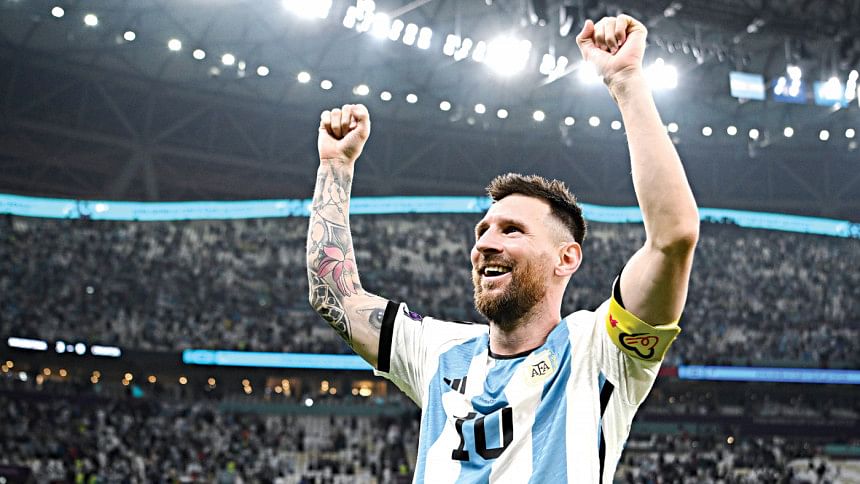Desert Fest: Next goal wins

Against the odds, Lionel Messi has secured a second shot at the World Cup after falling short in the final 8 years ago, but in the path to Argentina's supremacy stand reigning world champions France, primed to launch a dynasty by becoming the first team since World War II to retain football's greatest prize.
Among a host of other stars will also feature one Kylian Mbappe, leading the race for the Golden Boot and attempting to engineer, even if by force, a passing-of-the-torch moment.
But although the two teams have had very different paths to the final at the Lusail Stadium, their style of play has drawn many parallels. Both are teams primarily concerned with staying compact in defence and composed in possession, a perfect combination for tournament scenarios.
Their managers Lionel Scaloni and Didier Deschamps also have similarities, such as their pragmatic approach and focus on the tactics they know will bring results. That, coupled with the typically cagey nature of finals -- where no team wants to overextend only to concede the opening goal -- makes striking first paramount.
That puts tremendous pressure on the defensive end, and this is where France can draw the first advantage. Argentina have had an impressive defensive record in Qatar, but they have not held up well under bombardment, as evidenced by the late comeback by the Netherlands in their quarterfinal clash.
On the other hand, France have often launched a full-frontal assault to find a goal before retreating into a shell, daring the opponent to commit in numbers and leave spaces in behind for Mbappe and Ousmane Dembele to run into.
Against England in the quarterfinal, when the Three Lions equalised, France hit back in quick time and repeated the process. They did the same to Morocco, scoring one goal and completely abandoning possession, putting the Moroccans in the hole they had been digging for others.
From the way the statistics appear, it seems Morocco, and even England, were unlucky. But Morocco manager Walid Regragui, albeit in frustration, saw the bigger picture. "When you think you're close to winning against France, you're actually quite far. It leaves a bitter taste."
It is a characteristic of the team that Deschamps attributes to "a mix of skill, experience and fighter's mindset, even in bad times". That will serve them well, especially the last bit, considering that any opponent going up against Messi is undoubtedly in for a bad time, especially during what could go down as his magnum opus.
Coming into Qatar, Messi had never scored in the knockout stages of the World Cup. Now, has now scored in every round: the round of 16, quarterfinals, semifinals.
He has five goals and three assists and is gunning for both the Golden Ball and Golden Boot, although he may want to avoid the former award, which has only been won by the loser this century, as Messi will know. He has a painful reminder from 2014. The only thing left to tick off is a goal in the final and, of course, getting his hands on the elusive prize.
Of course, the stars of both teams can expect special dispensation. N'Golo Kante may not be around to shadow players this time around, but there is little doubt that France will extensively plan around Messi.
Argentina, however, will have a tougher choice about how to handle Mbappe. Deschamps showed his mean streak in the match against England, when Kyle Walker was man-marking Mbappe for 90 minutes, dictating his team to operate in the spaces that opened up in the middle as Mbappe took Walker for regular strolls to the touchline.
Argentina as a team have been spectacular as well, with most players proving exceptional in their respective supporting roles. They have also shown that they can score, meaning they are a threat to get that opening goal, but they have also shown the defensive steel that means they put up a strong resistance.
An early opening goal would make for best viewing in terms of entertainment and, if it does come, France should know how to hold on to their lead better, considering the experience on their side. Hugo Lloris, Antoine Griezmann, Olivier Giroud and Raphael Varane are the French players with the most time on the field in World Cup history. Even Mbappe, at 23 years old, is 10th on that list.
However, in terms of experience when it comes to creating and scoring goals, Argentina have the best of the best. Lionel Messi, after 24 minutes on Sunday, will have played the most total minutes in World Cup history, besting Italian legend Paolo Maldini.
He will have spent over 36 hours trying to lead Argentina to glory. At the end of another 90 or 120 minutes, the world will know whether or not those hours were ultimately in vain.

 For all latest news, follow The Daily Star's Google News channel.
For all latest news, follow The Daily Star's Google News channel. 



Comments